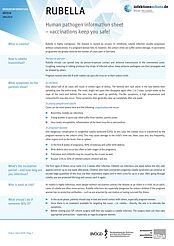In children
Only about half of all cases will result in visible signs of illness. The familiar skin rash starts in the face before then spreading over the entire body. The small, bright red spots then disappear again after 1 to 3 days. Lymph nodes at the nape of the neck and behind the ears may also swell up painfully. Flu-like symptoms, a high temperature and conjunctivitis may also occur. These symptoms then generally clear up completely after one week.
In young people and adults
Cases can be more severe here and the following complications can occur:
- Bronchitis, middle ear infections
- Young women in particular often suffer from swollen, painful joints
- Very rarely: encephalitis, inflammation of the heart muscles or pericardium
In pregnant women
One dangerous complication is congenital rubella syndrome (CRS). In this case, the rubella virus is transferred by the pregnant woman to her unborn child. This may cause damage to the child’s inner ear, heart, eyes and, less frequently, other organs such as the brain, liver or spleen.
- In the first 8 weeks of pregnancy, 90% of embryos will suffer birth defects.
- Birth defects also occur less often at later stages of the pregnancy.
- Premature and stillbirths may be caused by the viruses as well.
- Around 15% to 20% of infected unborn children will die.





